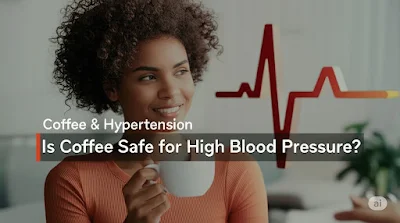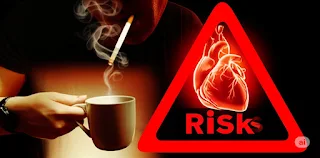Coffee and Hypertension: A Complete Guide to Understanding Blood Pressure Effects
Coffee is one of the world's most beloved beverages. Millions of people start their day with a cup of coffee. But if you have high blood pressure, you might wonder: "Is coffee safe for me?" This guide explains everything you need to know about coffee and hypertension.
What is Hypertension ( High Blood Pressure)?
Understanding Blood Pressure Basics
Blood pressure measures how hard your blood pushes against artery walls. When your heart beats, it pumps blood through your body. This creates pressure in your blood vessels.
Blood pressure readings have two numbers:
- Systolic pressure (top number): Pressure when your heart beats
- Diastolic pressure (bottom number): Pressure when your heart rests between beats
Blood Pressure Categories
- Normal: Less than 120/80 mmHg
- Elevated: 120-129 systolic and less than 80 diastolic
- Stage 1 Hypertension: 130-139 systolic or 80-89 diastolic
- Stage 2 Hypertension: 140/90 mmHg or higher
- Hypertensive Crisis: Higher than 180/120 mmHg
How Coffee Affects Blood Pressure
Immediate Effects of Coffee on Blood Pressure
When you drink coffee, several things happen in your body:
- Caffeine blocks adenosine receptors in blood vessels
- Blood vessels constrict (become narrower)
- Heart rate may increase
- Blood pressure rises temporarily
Research shows that coffee can raise blood pressure by 2-8 mmHg within 30 minutes of drinking it. This effect usually lasts 3-4 hours.
Long-term Effects: What Research Shows
The relationship between coffee and long-term blood pressure is complex. Recent studies reveal surprising findings:
- Short-term studies show coffee raises blood pressure temporarily
- Long-term studies suggest regular coffee drinking may not increase hypertension risk
- Some research indicates coffee might even reduce hypertension risk by 2% per cup daily
The Science Behind Coffee and Hypertension
How Caffeine Works in Your Body
Caffeine affects your cardiovascular system through multiple pathways:
Adenosine Receptor Blocking: Adenosine normally helps blood vessels relax. Caffeine blocks this, causing vessels to tighten.
Adrenaline Release: Caffeine triggers adrenaline release, which increases heart rate and blood pressure.
Calcium Channel Effects: Caffeine affects calcium movement in heart and blood vessel cells.
Other Compounds in Coffee
Coffee contains more than just caffeine:
- Chlorogenic acids: May help lower blood pressure
- Magnesium: Supports healthy blood pressure
- Potassium: Helps regulate blood pressure
- Antioxidants: Protect blood vessels from damage
Coffee Consumption Guidelines for People with Hypertension
Safe Coffee Intake Recommendations
For people with normal blood pressure:
- Up to 4 cups of coffee daily (400mg caffeine) is generally safe
For people with mild hypertension:
- 1-2 cups daily may be acceptable
- Monitor your blood pressure response
For people with severe hypertension:
- Consider limiting coffee to 1 cup daily or less
- Consult your doctor about coffee consumption
Warning Signs to Watch For
Stop drinking coffee and consult your doctor if you experience:
- Chest pain or discomfort
- Rapid or irregular heartbeat
- Severe headaches
- Dizziness or fainting
- Shortness of breath
Individual Factors That Matter
Who Should Be More Cautious?
Certain people may be more sensitive to coffee's blood pressure effects:
Age: Older adults may experience stronger effects Genetics: Some people metabolize caffeine slowly Existing conditions: Heart disease, anxiety disorders Medications: Blood pressure medications, stimulants Pregnancy: Pregnant women should limit caffeine
Building Coffee Tolerance
Regular coffee drinkers often develop tolerance to caffeine's blood pressure effects. This means:
- Long-term coffee drinkers may see smaller blood pressure increases
- Taking breaks from coffee can reset tolerance
- Gradual increase in consumption may reduce side effects
Practical Tips for Coffee Lovers with High Blood Pressure
Smart Coffee Drinking Strategies
-
Time your coffee consumption
- Avoid coffee close to blood pressure measurements
- Don't drink coffee before medical appointments
-
Choose your coffee wisely
- Light roast contains more caffeine than dark roast
- Espresso has less caffeine per serving than drip coffee
- Cold brew may be gentler on blood pressure
-
Monitor your response
- Check blood pressure before and after coffee
- Keep a coffee and blood pressure diary
- Note any symptoms or changes
Healthy Coffee Alternatives
If you need to reduce coffee intake, try:
- Decaffeinated coffee: Contains only 2-5mg caffeine per cup
- Green tea: Lower caffeine content with health benefits
- Herbal teas: Caffeine-free options like chamomile or rooibos
- Chicory coffee: Coffee-like taste without caffeine
Treatment and Management of Hypertension
Lifestyle Changes for Blood Pressure Control
Coffee is just one factor in blood pressure management. Other important steps include:
Diet Modifications:
- Reduce sodium intake to less than 2,300mg daily
- Increase potassium-rich foods (bananas, spinach, avocados)
- Follow the DASH diet (Dietary Approaches to Stop Hypertension)
- Limit alcohol consumption
Physical Activity:
- Aim for 150 minutes of moderate exercise weekly
- Include both cardio and strength training
- Start slowly and gradually increase intensity
Stress Management:
- Practice relaxation techniques
- Consider meditation or yoga
- Get adequate sleep (7-9 hours nightly)
Medical Treatment Options
Medication Types:
- ACE inhibitors: Help blood vessels relax
- Calcium channel blockers: Prevent vessel constriction
- Diuretics: Remove excess fluid from the body
- Beta-blockers: Slow heart rate and reduce blood pressure
Regular Monitoring:
- Home blood pressure monitoring
- Regular doctor visits
- Medication adjustment as needed
- Lifestyle counseling
When Coffee Becomes Dangerous
High-Risk Situations
Coffee consumption may be particularly risky for people with:
Severe Hypertension (180/120 mmHg or higher):
- Risk of stroke or heart attack increases significantly
- Even small blood pressure increases can be dangerous
Uncontrolled Hypertension:
- Blood pressure not well-managed with medication
- Frequent blood pressure spikes
Heart Conditions:
- Recent heart attack or stroke
- Heart rhythm problems
- Heart failure
Emergency Situations
Seek immediate medical attention if you experience:
- Blood pressure over 180/120 mmHg
- Severe headache with high blood pressure
- Chest pain or difficulty breathing
- Vision changes or confusion
- Numbness or weakness
Why Combining Coffee and Smoking Is Dangerous
Many people enjoy drinking coffee while smoking, but this combination can be very harmful. Both caffeine and nicotine stimulate the heart and blood vessels, causing your blood pressure and heart rate to rise. When used together, their effects don’t just add up — they can amplify each other, putting extra strain on your cardiovascular system. This “double impact” increases the risk of heart problems much more than either substance alone. For people with high blood pressure or heart conditions, drinking coffee and smoking at the same time can be especially dangerous and should be avoided. Understanding this helps you make safer choices for your health.The Bottom Line: Coffee and Your Health
Key Takeaways
- Coffee's effects vary by person: Your response may differ from others
- Timing matters: Coffee raises blood pressure temporarily
- Moderation is key: 1-2 cups daily may be safe for most people with mild hypertension
- Severe hypertension requires caution: Limit or avoid coffee if you have very high blood pressure
- Overall lifestyle matters most: Coffee is just one factor in blood pressure management
Making Informed Decisions
Talk to your healthcare provider about coffee consumption if you have:
- Diagnosed hypertension
- Heart disease
- Take blood pressure medications
- Experience symptoms after drinking coffee
Remember, managing hypertension requires a comprehensive approach. Coffee consumption should be considered alongside other lifestyle factors and medical treatments.
The Bottom Line: Coffee and Your Health
As we've explored, the relationship between coffee and hypertension is nuanced and highly individual. While a cup of coffee can indeed cause a temporary spike in blood pressure due to its caffeine content, the long-term impact on hypertension risk isn't as clear-cut and, for some, may even be beneficial.
The key takeaways are clear: coffee's effects vary by person, and what's safe for one individual may not be for another. Timing matters, as the temporary blood pressure increase typically subsides within a few hours. Moderation is key, with 1-2 cups daily often deemed acceptable for those with mild hypertension, provided they monitor their individual response. However, if you have severe hypertension, exercise extreme caution and consider limiting or avoiding coffee altogether. Most importantly, remember that overall lifestyle matters most. Coffee is just one piece of a much larger puzzle when it comes to managing your blood pressure.
Making informed decisions about your coffee consumption means being attuned to your body and your specific health needs. If you have diagnosed hypertension, heart disease, are taking blood pressure medications, or experience any concerning symptoms after drinking coffee, the most crucial step is to talk to your healthcare provider. They can offer personalized advice based on your medical history and current health status.
Ultimately, managing hypertension requires a comprehensive approach that extends far beyond your coffee cup. It encompasses diet, exercise, stress management, and, when necessary, medical treatment. By understanding the intricate dance between coffee and your cardiovascular system, and by partnering with your doctor, you can continue to enjoy your favorite brew while making choices that support your long-term health.
References & Sources
-
Mayo Clinic. "Caffeine: How does it affect blood pressure?" https://www.mayoclinic.org/diseases-conditions/high-blood-pressure/expert-answers/blood-pressure/faq-20058543
-
American Heart Association. "People with very high blood pressure may want to go easy on the coffee" https://www.heart.org/en/news/2022/12/21/people-with-very-high-blood-pressure-may-want-to-go-easy-on-the-coffee
-
Harvard Health Publishing. "Coffee and your blood pressure" https://www.health.harvard.edu/heart-health/coffee_and_your_blood_pressure
-
National Center for Biotechnology Information. "Coffee Intake and Risk of Hypertension: A Meta-Analysis of Cohort Studies" https://www.ncbi.nlm.nih.gov/pmc/articles/PMC9678658/
-
PubMed. "Coffee consumption and risk of hypertension: a systematic review and dose-response meta-analysis of cohort studies" https://pubmed.ncbi.nlm.nih.gov/29302055/
-
Nature Journal of Human Hypertension. "Coffee consumption and risk of hypertension: a systematic review and dose–response meta-analysis of cohort studies" https://www.nature.com/articles/s41371-017-0007-0
-
JAMA Internal Medicine. "Coffee Intake and Risk of Hypertension: The Johns Hopkins Precursors Study" https://jamanetwork.com/journals/jamainternalmedicine/fullarticle/211334
-
Centers for Disease Control and Prevention. "High Blood Pressure Facts" https://www.cdc.gov/bloodpressure/facts.htm
-
National Heart, Lung, and Blood Institute. "High Blood Pressure" https://www.nhlbi.nih.gov/health/high-blood-pressure
-
World Health Organization. "Hypertension" https://www.who.int/news-room/fact-sheets/detail/hypertension





